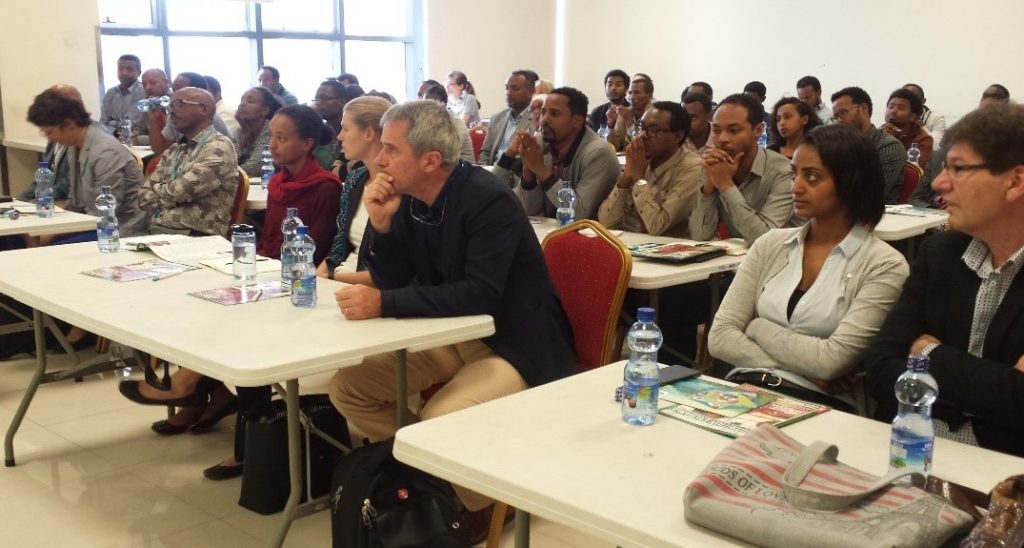
Almost eighty researchers, program implementers and policy makers came together at the Ethiopian Public Health Institute (EPHI) on September 7, 2018 to discuss how food systems and diets are interlinked in Ethiopia. This opportunity was provided by the National Information Platform for Nutrition (NIPN) which convened its first Nutrition Research and Policy Seminar around this theme. The event, which is part of the NIPN’s outreach strategy, was organized by EPHI in partnership with IFPRI under its Compact2025 initiative.
Recent Ethiopian policies increasingly call for food system transformation to support efforts that address malnutrition. Although well accepted, it is not yet clear how to operationalize food system transformation. Hence, the seminar attracted interest from key researchers, program implementers and donors. Solomon Eshetu, Director of the Food Science and Nutrition Research Division of EPHI who gave opening remarks and acknowledged the need to operationalize policies for food system transformation.
Bart Minten, program leader of IFPRI’s Ethiopia Strategy Support Program presented on the drivers of changing food systems and how this reflects on diet transformation. His paper, “Evolving Food Systems in Ethiopia: Past, Present and Future,” demonstrates how Ethiopia’s population growth, infrastructural development, and growing incomes have driven food system and dietary transformation. While more diverse foods is been produced and consumed, this also comes with increased consumption of high-value products, which call for concern related to overweight and obesity.
Mestawet Gebru, Research Officer in the Food Systems for Healthier Diets research flagship at Bioversity International, presented on “Food Systems for Healthier Diets in Ethiopia: Toward a Research Agenda”. Mestawet gave a brief background on the interaction between poor diet and unhealthy environment that results in chronic undernutrition and obesity in urban centers simultaneously. She also discussed the types of research that can support operationalizing food systems approaches to improve diets in Ethiopia. Her presentation identified three main research streams that can help food systems deliver on healthy diets, including (1) identifying drivers behind dietary patterns and gaps; (2) understanding the impact of consumer food choices, access to markets, and supply-side interventions, and (3) studying the institutional and policy processes for food system approaches for healthier diets.
Both presentations were well received, with participants reflecting on the comprehensive, holistic overview of the topic and the presentations, which were easy to understand. The seminar ended with a concluding remark from Namukulo Covic, Senior Research Coordinator in the Poverty, Health and Nutrition Division of IFPRI. She stressed the role that NIPN can play to strengthen the nutrition information system whilst tracking the balance between better nutrition and overweight or obesity
NIPN will continue to hold these monthly seminars to bring stakeholders together to present and discuss findings from various research institutes around specific themes related to nutrition.
NIPN is part of a global initiative launched by the European Commission, BMGF and DFID to support countries with a large burden of undernutrition. It promotes the creation of country-owned multi sectoral information platforms for nutrition which will guide evidence-based decision making for nutrition policies and programming.


